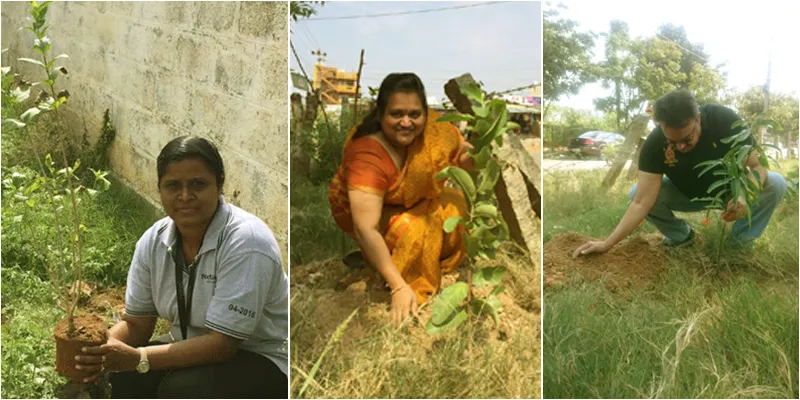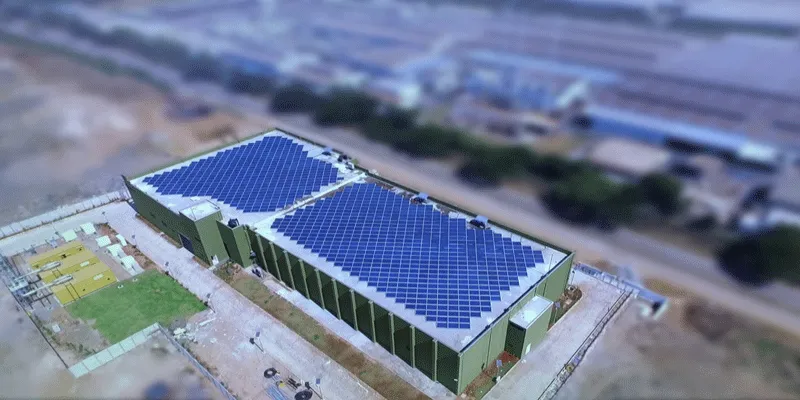Data centres are known for huge power consumption. See how this four-year-old startup is changing that
This article is sponosred by NxtGen.
During the recently-concluded Diwali festivities, most corporates would have sent across sweets, dry fruits or other mementoes to clients and well-wishers. However, a few organisations skipped this traditional gesture, opting for something with more long-term impact. One such company is NxtGen Data Center & Cloud Technologies Pvt. Ltd.
The four-year-old startup wanted to celebrate the festival of lights by giving back to the community. On behalf of its clients and employees, NxtGen decided to fund the planting of 5,000 saplings across locations in Bangalore, Nilgiris in Tamil Nadu, Barmer in Rajasthan and Talupula in Andhra Pradesh. NxtGen celebrated a Green Diwali in collaboration with the SankalpTaru Foundation, a non-profit that initiates, develops and manages reforestation and environmental conservation projects across India with rural livelihood projects.

As part of the initiative, SankalpTaru will be working closely with beneficiary farmers in nurturing the saplings planted by NxtGen via sustainable farming methods. The saplings will be geo-tagged and taken care for the next two years, after which the trees will be able to sustain themselves.
Raj Gopal A S, Managing Director, NxtGen, says, “In most tree plantation drives, once a sapling is planted, it is forgotten. No one knows if the sapling has survived or not to understand the impact of the initiative. That’s why we were keen to have all the trees geo-tagged to monitor their growth. Also, the initiative has been designed in such a way that the saplings are either medicinal or fruit-bearing trees. So once they grow, the trees will double up as source of livelihood for beneficiaries, apart from positively impacting the environment.” Through a backend system, NxtGen’s clients and employees received an email notification allowing them to see a photograph and the location of ‘their’ tree on Google maps.
Sustainability and green initiatives like these are at the core of NxtGen’s philosophy. Headquartered in Singapore, the startup is an emerging leader providing fully managed cloud and data centre services across India and Singapore. The company offers services through on-premise resources, at NxtGen’s own Datacenter facilities, or a combination of both. NxtGen enables its customers to adopt a hybrid computing model and build digital businesses without investing and managing complex IT infrastructure.
India has a seasonal shortage of power, and traditional methods of generating power by burning coal or naphtha are harmful for the environment and are not renewable. In addition, there are huge electrical losses during transmission from the producer to the consumer. However, with more mature green energy technologies entering the market, there have been increased instances of large-scale deployment in the country. NxtGen is one such example.
Data centres are known for huge power consumption, but NxtGen believes in being responsible and capitalising on renewable energy sources. The startup has built India’s largest carrier-neutral data centre at Bidadi which partially draws power from solar panels. The solar plant will mitigate 57,54,427 kg of CO2 over its project life making it India’s first green data centre.

“Data centres consume a lot of power not just for computing but also to cool the heat generated from the computing equipment,” explains Raj Gopal. “We are making a conscious attempt to use power from renewable sources such as solar and wind. While it takes effort and investment to go carbon neutral, it really pays off. On one hand, you are working on a socially responsible action, and on the other hand it gives NxtGen the edge when clients have to choose a data centre service provider. Most of them appreciate the extra effort that we put in,” he adds.
The CEO says, “Efficiency is at the core of our design. Most data centres are designed to host an electric bulb, where the assumption is that power consumption of computing equipment and cooling loads will be constant. Based on decades of operational experience, we decided to design our facility for variable loads and variable cooling. The success of this design motivates our team to look for more options to save energy in every nook and corner. In short, we have embedded the practice of being frugal on power consumption deep into our culture.”
“The most important thing is that we should be energy efficient, irrespective of whether the energy source is green or not,” explains Raj Gopal. In the initial days, their efforts were focused on ensuring that their consumption was 35-45% lower than other data centres. “Our designs were tested with a prototype prior to embarking on large scale investment for the data centre facility at Bidadi near Bangalore.”
Situated on a 10-acre campus, the data centre at Bidadi is ideally located for critical systems operations. This project was executed with a server-out’ design, incorporating most modern technologies to deliver increased availability, energy efficiency and environmental responsibilities. Once LEED Gold certified, the data centre will be one of the most energy-efficient data centres in the region. Be it the choice of colour, infrastructure that has been used to build the facility, or the design, everything aligns with NxtGen’s focus area of sustainability.
Watch the video to get an inside-out perspective of how NxtGen has executed the project and the advantages it brings.
Funded by Intel Capital, International Finance Corporation (IFC), and Axon Partners, NxtGen continues to push the boundaries of the IT infrastructure domain with its unique and cost-effective solutions, while keeping sustainability at its core.







